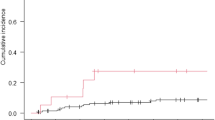Abstract
The best management of patients with brain metastases from an unknown primary tumour is still unclear, as data are scarce and studies are retrospective. We report 33 patients with biopsy-proven brain metastases from a primary tumour not found at the first investigations, who were treated by surgery and/or radiotherapy and followed with serial CT until death. Median survival time for all patients was 10 months and survival rates at 6 months, 1 year and 2 years were 76 %, 42 % and 15 % respectively. Patients with single brain metastasis treated by gross total resection and whole-brain radiotherapy (WBRT) had a median survival of 13 months with 76 % alive at 6 months, 57 % at 1 year and 19 % at 2 years. Patients with multiple brain metastases who underwent either WBRT alone or WBRT preceded by gross total resection of the symptomatic lesions had a poorer prognosis: median survival of 6–8 months with 50–100 % alive at 6 months, 17–20 % at 1 year and none alive at 2 years. In 85 % of patients with a single brain metastasis a significant improvement in neurological functions was observed after surgical resection; among patients with multiple brain metastases a neurological improvement was observed in all patients who had a resection of symptomatic lesions and only in a half of patients who had WBRT alone. During the follow-up the primary tumour was found in 27/33 patients (82 %) and was located in the lung in 78 %. Between 1987 and 1991 (with limited screening for the primary tumour in the follow-up) the unknown tumours were 6/15 (40 %); in the more recent period (1992–1996) (CT-based screening for the primary tumour in the follow-up) no primary tumour remained unknown but overall survival has not significantly improved. The number of brain metastases was the only significant factor affecting survival after both univariate and multivariate analysis. This study suggests that, in patients with both single and multiple brain metastases from an undetected primary site when first studied, surgery and/or WBRT enable the control of the brain disease, partly because the systemic disease may be silent for a prolonged time. Only a few asymptomatic patients may benefit from an early detection and treatment of the primary tumour during the follow-up.
Similar content being viewed by others
Author information
Authors and Affiliations
Additional information
Received: 1 May 2000 / Received in revised form: 13 October 2000 / Accepted: 10 December 2000
Rights and permissions
About this article
Cite this article
Rudà, R., Borgognone, M., Benech, F. et al. Brain metastases from unknown primary tumour . J Neurol 248, 394–398 (2001). https://doi.org/10.1007/s004150170180
Issue Date:
DOI: https://doi.org/10.1007/s004150170180




